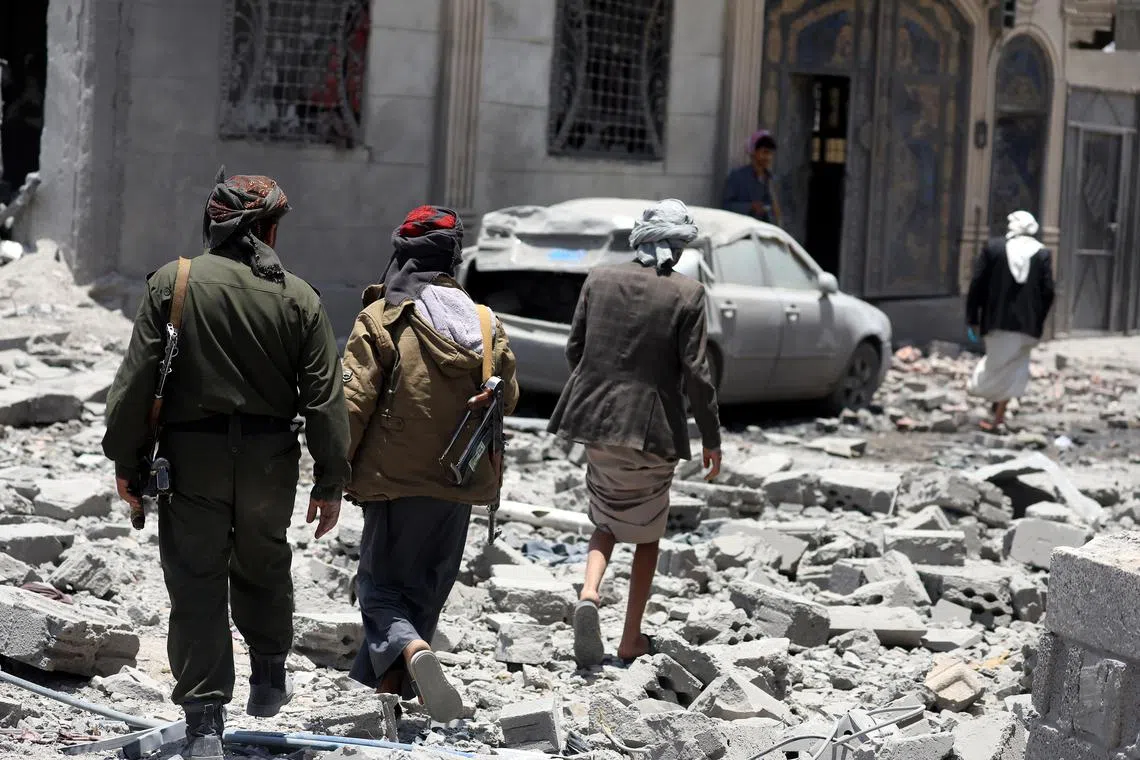Trump announces deal to stop bombing Houthis, end shipping attacks
Sign up now: Get ST's newsletters delivered to your inbox

People inspecting the damage after US air strikes targeted a neighbourhood in Yemen's capital Sanaa, on April 27.
PHOTO: EPA-EFE
WASHINGTON/CAIRO - President Donald Trump announced on May 6 that the US will stop bombing the Houthis in Yemen, saying that the Iran-backed group had agreed to stop interrupting important shipping lanes in the Middle East.
After Mr Trump made the announcement, Oman said it had mediated the ceasefire deal, marking a major shift in Houthi policy since the start of Israel’s war in Gaza in October 2023.
Under the agreement, neither the US nor the Houthis would target each other, including US vessels in the Red Sea and Bab al-Mandab Strait, Oman said in a statement.
The statement from Oman did not mention whether the Houthis had agreed to stop attacks on Israel. Mr Mahdi al-Mashat, head of Yemen’s Houthi Supreme Political Council, said the group would continue to support Gaza and that such attacks would continue.
“To all Zionists, from now on, stay in shelters or leave to your countries immediately as your failed government will not be able to protect you after today,” the Houthi-run Al-Masirah TV cited him as saying.
Separately, Mr Mohammed Ali al-Houthi, head of the Houthis’ Supreme Revolutionary Committee, said the US halt of “aggression” against Yemen would be evaluated, according to a post on X.
The US intensified strikes on the Houthis in 2025 to stop attacks on Red Sea shipping. Rights activists have raised concerns over civilian casualties.
Mr Trump said of the Houthis during an Oval Office meeting with Canadian Prime Minister Mark Carney: “They said, ‘Please don’t bomb us any more and we’re not going to attack your ships.’ And I will accept their word, and we are going to stop the bombing of the Houthis, effective immediately.”
Qatar and Kuwait welcomed the ceasefire deal in separate statements on May 6, expressing hopes for the step to secure freedom of navigation.
The Houthis have been firing at Israel and shipping in the Red Sea since Israel began its military offensive against Hamas in Gaza, after the Palestinian militant group’s deadly attack on Israel on Oct 7, 2023.
The US military previously said it has struck more than 1,000 targets since its current operation in Yemen, known as Operation Rough Rider, started on March 15. The strikes, the US military said, have killed “hundreds of Houthi fighters and numerous Houthi leaders”.
Houthi, Israeli strikes
Tensions have been high since the Gaza war began, but have risen further since a Houthi missile landed near Israel’s Ben Gurion Airport on May 4, prompting Israeli air strikes on Yemen’s Hodeidah Port on May 5.
The Israeli military carried out an air strike on Yemen’s main airport in Sanaa on May 6, its second attack in two days against the Houthis after a surge in tensions between the group and Israel.
Under former president Joe Biden’s administration, the US and Britain retaliated with air strikes against Houthi targets in an effort to keep open the crucial Red Sea trading route – the path for about 15 per cent of global shipping traffic.
Mr Trump did not say whether Britain had also agreed to the ceasefire.
After Mr Trump became US president in January, he decided to significantly intensify air strikes against the Houthis. The campaign came after the Houthis said they would resume attacks on Israeli ships passing through the Red Sea and Arabian Sea, the Bab al-Mandab Strait and Gulf of Aden.
On April 28, a suspected US air strike hit a migrant centre in Yemen, in which Houthi TV said 68 people were killed in one of the deadliest attacks in six weeks of intensified US strikes. REUTERS


